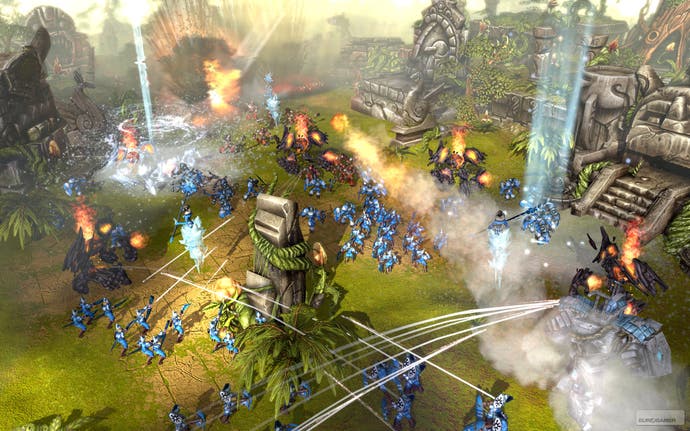Battleforge
Deal or no deal?
Genre mash-ups are nothing new, of course. Many games attempt to drum up interest by splicing the popular elements from different gaming styles, and the result can either be refreshing or desperate, depending on how compatible the transplanted parts are. However, few mash-ups are as ambitious, or as acronym-unfriendly, as Battleforge. Borrowing bits and pieces from World of Warcraft, Warcraft III and Magic: The Gathering, it's the first ever massively-multiplayer online real-time strategy collectible card game. Call it an MMORTSCCG, if you must. Just don't blame me if you cough up a hairball trying to pronounce it.
The meat of the game is real-time strategy, although it eschews the usual resource-harvesting and base-building micromanagement. New troops can be spawned wherever there are active units, and the only restrictions come from your power reserves. Find a dormant power crystal, activate it and it starts feeding points into your reservoir automatically until it runs dry or is smashed by the enemy. Each new unit spawned, structure created or spell cast depletes your power pool. Defeated or destroyed units pour their cost back into use after a short time.
Also dictating your abilities are elemental orbs, and it's here that the collectible card element comes into play. Rather than selecting a race or faction and making use of whatever comes with the territory, you're able to build and customise your own army culled from packs of virtual cards.
Cards come in four varieties - fire, frost, nature and shadow - and each suit includes ground troops, archer units, defence towers and spells. Each card has its own power cost, but also requires a certain number of magical orbs. These are also found dotted strategically around the maps, and when activated you can choose which form they will take. Some cards require up to four orbs of the same colour, while others only need one of its own colour with additional orbs of any colour before they become available. Each card can be used a set number of times to spawn the relevant unit or effect, after which it only recharges after a lengthy cooldown period, rendering it significantly less useful.

As your collection grows, you can create a variety of different decks of up to twenty cards, and experiment with new combinations in the Forge, a practice arena that doubles as your gameplay hub. Clearly, there's a fair amount of tactical thought required to build a good deck, balancing out affordable troops that can carry a battle in the early stages against the heavy-hitters that can only come into play once you've amassed enough orbs. There are also the elemental properties to consider, with fire cards being better for offensive play, while frost tends to offer more defensive options, for example
Cards can also be upgraded through successful play, and traded online using the rudimentary Battleforge auction system - eBay it is not, but it's a way of getting rid of duplicates or nabbing an ultra-rare - and it's here that alarm bells may start to ring for a lot of potential players. The auctions use the in-game currency, and booster packs can also be purchased. The in-game currency, however, must be purchased using real money. So yes, this is a game built around micropayments. The cost of new packs is hardly steep, running to a couple of Her Majesty's pounds for six random new cards, but some will still balk at the very concept.
There are good reasons to be dubious, even if you don't have a natural aversion to micropayments. Balance is arguably the most vital element of any RTS game, and by offering a world in which players can create a vast array of possible combinations, any hope of maintaining that balance is gone.


